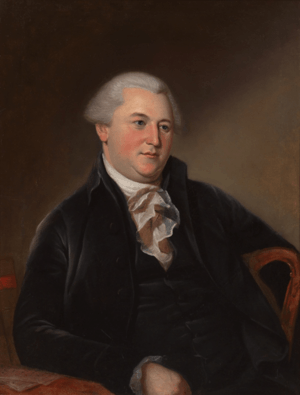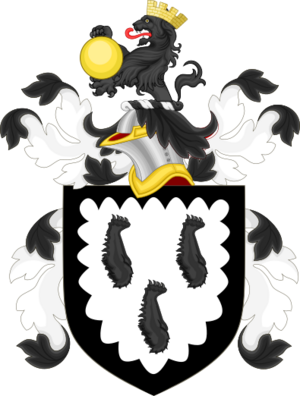Gunning Bedford Jr. facts for kids
Quick facts for kids
Gunning Bedford Jr.
|
|
|---|---|

portrait by Charles Willson Peale
|
|
| Judge of the United States District Court for the District of Delaware | |
| In office September 26, 1789 – March 30, 1812 |
|
| Appointed by | George Washington |
| Preceded by | Seat established by 1 Stat. 73 |
| Succeeded by | John Fisher |
| Delegate to the Continental Congress from Delaware | |
| In office October 26, 1784 – October 27, 1786 |
|
| In office February 1, 1783 – April 8, 1784 |
|
| Personal details | |
| Born |
Gunning Bedford Jr.
1747 Philadelphia, Province of Pennsylvania, British America |
| Died | March 30, 1812 (aged 64–65) Wilmington, Delaware |
| Resting place | Wilmington and Brandywine Cemetery Wilmington, Delaware |
| Relatives | Gunning Bedford Sr.; Gertrude Franklin |
| Education | Princeton University read law |
Gunning Bedford Jr. (born in 1747, died March 30, 1812) was an important person in early American history. He is known as a Founding Father. He helped create the United States Constitution.
Bedford was a delegate to the Continental Congress, which was like an early American government. He also served as the Attorney General of Delaware. Later, he became a federal judge for the state of Delaware.
Contents
Early Life and Learning
Gunning Bedford Jr. was born in 1747 in Philadelphia, Pennsylvania. He came from a wealthy family and was one of eleven children.
He went to the College of New Jersey, which is now called Princeton University. He graduated with honors in 1771. One of his classmates was James Madison, who later became a U.S. President. After college, Bedford became a lawyer in Delaware.
Serving the New Nation
During the American Revolutionary War, Bedford helped the American cause. He worked for the Continental Army, helping to organize troops. He even served briefly as an aide to General George Washington.
After the war, Bedford continued to serve his country. He was a delegate to the Congress of the Confederation from 1783 to 1785. This was the government that existed before the U.S. Constitution was written.
He also served as the Attorney General for Delaware from 1784 to 1789. This means he was the chief lawyer for the state.
The Constitutional Convention
In 1787, Gunning Bedford Jr. was chosen to be a delegate to the Constitutional Convention. This was a very important meeting where leaders from different states gathered. Their goal was to create a new plan for the United States government, which became the U.S. Constitution.
Bedford was one of the people who signed the Constitution. During the convention, he strongly supported the rights of smaller states. He wanted to make sure they had a fair say in the new government.
After the Constitution was written, Bedford helped Delaware approve it. Delaware was the first state to ratify, or officially approve, the Constitution in 1787.
Becoming a Federal Judge
In 1789, President George Washington chose Gunning Bedford Jr. to be a federal judge. He became a judge for the United States District Court for the District of Delaware. He served in this important role until his death in 1812.
Bedford was also a strong supporter of ending slavery. He believed it was wrong and worked to abolish it.
Family Life
Gunning Bedford Jr. was a cousin to another important person named Gunning Bedford Sr.. His cousin was a Governor of Delaware.
In the early 1770s, Gunning Bedford Jr. married Jane Ballareau Parker. Her father, James Parker, was a printer who had learned from Benjamin Franklin. Gunning and Jane had five children, but none of them ever married. In 1793, he bought a large property called Lombardy Hall in Delaware.
Death and Lasting Impact
Gunning Bedford Jr. died on March 30, 1812, while still serving as a federal judge. He was first buried in a cemetery in Wilmington. Later, his remains were moved to the Masonic Home Cemetery in Christiana, Delaware. This cemetery is now where the Wilmington Institute Library stands.
Gunning Bedford Jr. is remembered for his important contributions to the founding of the United States. He helped shape the laws and government of the new nation.
Images for kids
 | Frances Mary Albrier |
 | Whitney Young |
 | Muhammad Ali |





